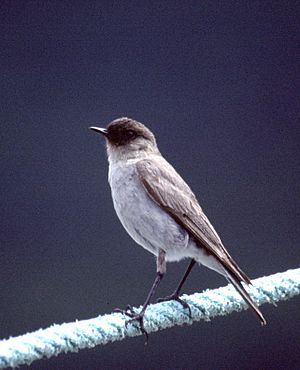Dark-faced ground tyrant facts for kids
Quick facts for kids Dark-faced ground tyrant |
|
|---|---|
 |
|
| near Lago Escondido, Tierra del Fuego, Argentina | |
| Conservation status | |
| Scientific classification |
|
| Kingdom: | Animalia |
| Phylum: | Chordata |
| Class: | Aves |
| Order: | Passeriformes |
| Family: | Tyrannidae |
| Genus: | Muscisaxicola |
| Species: |
M. maclovianus
|
| Binomial name | |
| Muscisaxicola maclovianus (Garnot, 1829)
|
|
| Script error: The function "autoWithCaption" does not exist. | |
Script error: No such module "Check for conflicting parameters".
The dark-faced ground tyrant (Muscisaxicola maclovianus) is a small bird that belongs to the tyrant flycatcher family. These birds live on the ground. They breed in the southern Andes mountains and on the Falkland Islands. They eat small invertebrates like flies and moths.
Contents
What Does the Dark-faced Ground Tyrant Look Like?
This bird is about 16 centimeters (6.3 inches) long. Male birds are usually a little bigger than females. Like other ground tyrants, it has long legs and stands very straight.
Its feathers are mostly dark grey-brown on top. The underside is a pale grey. It has a dark brown head and a blackish face. Its back and tail are black, with white feathers on the outer parts of its tail. Both its legs and bill are black.
Birds living on the Falkland Islands are usually larger and greyer than those found on the mainland of South America.
What Does Its Song Sound Like?
The dark-faced ground tyrant has a soft, twittering song. It can sing while it is on the ground or when it is flying.
Where Does the Dark-faced Ground Tyrant Live?
These birds breed in the southern parts of Chile and Argentina. They also breed on the Falkland Islands. They like open areas, from sea level up to 1,500 meters (about 4,900 feet) high in the Andes mountains.
Does It Migrate?
During the austral winter (which is summer in the northern hemisphere), some of these birds migrate north. They can travel as far as Uruguay, northern Argentina, and Peru. In winter, they move to lower areas. You might even see them on farms, in gardens, or on beaches.
How Does the Dark-faced Ground Tyrant Have Babies?
The dark-faced ground tyrant builds its nest among rocks. It makes the nest from grass and root fibers. It lines the inside with soft wool or feathers.
The female usually lays two or three eggs. The eggs are white with red-brown spots. These birds likely raise two groups of babies during the breeding season.
See also
 In Spanish: Dormilona carinegra para niños
In Spanish: Dormilona carinegra para niños
 | John T. Biggers |
 | Thomas Blackshear |
 | Mark Bradford |
 | Beverly Buchanan |


